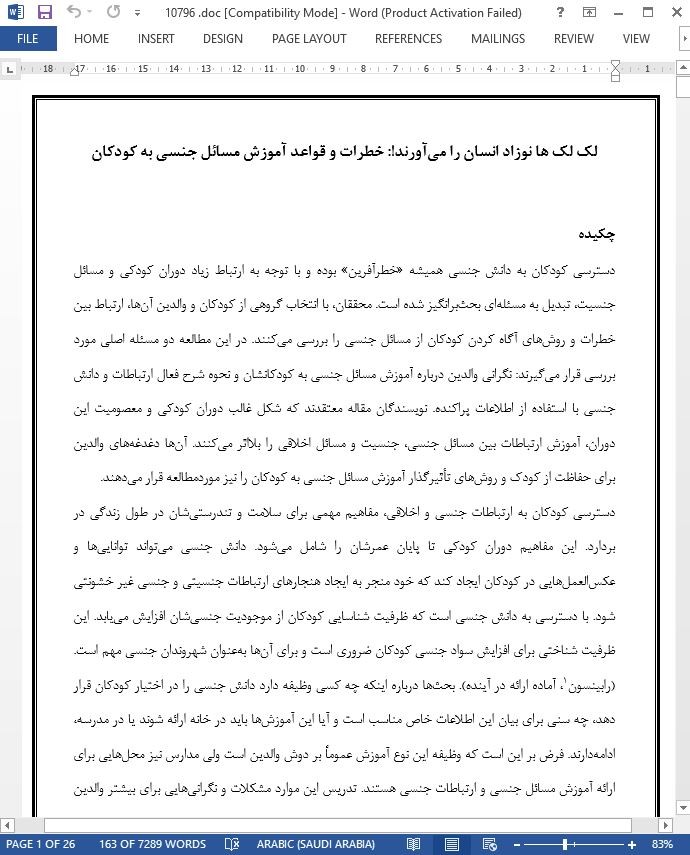
خطرات و قواعد آموزش مسائل جنسی به کودکان
چکیده
دسترسی کودکان به دانش جنسی همیشه «خطرآفرین» بوده و با توجه به ارتباط زیاد دوران کودکی و مسائل جنسیت، تبدیل به مسئلهای بحثبرانگیز شده است. محققان، با انتخاب گروهی از کودکان و والدین آنها، ارتباط بین خطرات و روشهای آگاه کردن کودکان از مسائل جنسی را بررسی میکنند. در این مطالعه دو مسئله اصلی مورد بررسی قرار میگیرند: نگرانی والدین درباره آموزش مسائل جنسی به کودکانشان و نحوه شرح فعال ارتباطات و دانش جنسی با استفاده از اطلاعات پراکنده. نویسندگان مقاله معتقدند که شکل غالب دوران کودکی و معصومیت این دوران، آموزش ارتباطات بین مسائل جنسی، جنسیت و مسائل اخلاقی را بلااثر میکنند. آنها دغدغههای والدین برای حفاظت از کودک و روشهای تأثیرگذار آموزش مسائل جنسی به کودکان را نیز موردمطالعه قرار میدهند. دسترسی کودکان به ارتباطات جنسی و اخلاقی، مفاهیم مهمی برای سلامت و تندرستیشان در طول زندگی در بردارد. این مفاهیم دوران کودکی تا پایان عمرشان را شامل میشود. دانش جنسی میتواند تواناییها و عکسالعملهایی در کودکان ایجاد کند که خود منجر به ایجاد هنجارهای ارتباطات جنسیتی و جنسی غیر خشونتی شود. با دسترسی به دانش جنسی است که ظرفیت شناسایی کودکان از موجودیت جنسیشان افزایش مییابد. این ظرفیت شناختی برای افزایش سواد جنسی کودکان ضروری است و برای آنها بهعنوان شهروندان جنسی مهم است. (رابینسون ، آماده ارائه در آینده). بحثها درباره اینکه چه کسی وظیفه دارد دانش جنسی را در اختیار کودکان قرار دهد، چه سنی برای بیان این اطلاعات خاص مناسب است و آیا این آموزشها باید در خانه ارائه شوند یا در مدرسه، ادامهدارند. فرض بر این است که وظیفه این نوع آموزش عموماً بر دوش والدین است ولی مدارس نیز محلهایی برای ارائه آموزش مسائل جنسی و ارتباطات جنسی هستند. تدریس این موارد مشکلات و نگرانیهایی برای بیشتر والدین و معلمین به همراه دارند. این نگرانیها ریشه در خودداری خانواده و مدرسه از آموزش مؤثر مسائل جنسی به کودکان دارد. (رابینسون و دیویس ، 2008 الف؛ گلدمن ، 2010)
نتیجهگیری
ضروری است والدین برای افزایش اعتماد، دانش و انعطافپذیری کودکانشان با بهترین روش ارائه اطلاعات جنسی، حمایتشده و آموزش ببینند. حمایت و آموزش زمانی سخت میشود که ارتباط بین کودکی و مسائل جنسی تبدیل به موضوعی خصوصی میشود و فرصتهای کمی رخ میدهد که والدین و معلمین بتوانند دراینباره بحثهای دوستانه و صادقانه انجام دهند. بعلاوه ارزشهای اجتماعی-فرهنگی غرب باعث سرکوب چنین گفتگوهایی میشود و فرقی ندارد که این گفتگوها بین بزرگسالان، یا بزرگسالان و کودکان باشد. در تحقیق ما مشخص شد که والدین آموزش جنسی کودکان را کاری خطرناک میدانند. کارهایی که والدین در این حوزه انجام میدهند بهشدت تحت تأثیر گفتمانهای غالب کودکی و معصومیت این دوران است. والدین کاملاً آگاه بودند که باید آموزش زودهنگام مسائل جنسی را به کودکان خود شروع کنند تا سواد جنسیشان شکلگرفته و قادر باشند با مظاهر فرهنگی جنسیت و تمایلات جنسی کنار بیایند. بیشتر والدین به دلیل اینکه فکر میکردند مهارت لازم برای آموزش مسائل جنسی را به کودکانشان ندارد ابراز نگرانی میکردند.
ABSTRACT
Children’s access to sexual knowledge has always been considered ‘risky’ and controversial due to the fraught relationship between childhood and sexuality. Based on focus groups with children and their parents, the authors explore the relationship between risk and regulation associated with providing children with accurate knowledge about sexuality. Two main issues are examined: parents’ anxieties associated with educating their children about sexuality; and how children actively build narratives around relationships and sexual knowledge based on the fragments of information available to them. The authors argue that dominant constructions of childhood and childhood innocence negate the effective education of children around sexuality, gender and ethical relationships. Additionally, they examine the tensions that exist for many parents around the discourse of child protection and the ways in which this impacts on their education of young children about sexual matters. Children’s access to knowledge about sexuality and ethical relationships has crucial implications for their health and well-being, not just in the early years but also throughout their lives. This knowledge can build children’s competencies and resilience, contributing to new cultural norms of non-violence in gendered and sexual relationships. It also develops children’s capacity to understand their own sexual subjectivity, which is critical for fostering their literacy with regard to sexual knowledge and is essential to their rights as sexual citizens (Robinson, forthcoming). However, debates continue about whose role it is to provide children with sexual knowledge, at what age it is appropriate to impart certain information, and whether this education should take place in the home or in schools. This area of education has been generally considered parents’ responsibility, but schools have increasingly become sites for the introduction of sexuality and relationships education. For many parents and educators, teaching children about these issues is fraught with difficulties and anxieties. These tensions can result in the family or schooling avoiding or not effectively addressing sex education with children (Robinson & Davies, 2008a; Goldman, 2010).
Conclusion
In order to contribute to children’s confidence, competence and resilience it is critical that parents are supported and educated about how best to communicate information about sexual matters to their children. This becomes difficult when the relationship between childhood and sexuality is one that is considered a private matter and is so regulated that there are few opportunities for parents and educators to have frank and honest discussions about these issues. In addition, western sociocultural values often contribute to the silencing of such conversations whether they are between adults, or adults and children. Educating children about sexuality was considered risky business by parents in our research. Parents’ practices in this area were heavily influenced by dominant discourses of childhood and childhood innocence. Parents were often acutely aware that it was critical to begin educating their children early about sexual matters to build their critical literacy in order to counteract popular cultural representations of gender and sexuality. However, many parents were concerned that they do not have the skills to teach their children about sexuality.

چکیده
خطرات و قواعد آموزش مسائل جنسی به کودکان
روش تحقیق
تفکرات و اعمال والدین و خطرات آموزش مسائل جنسی به کودکان
همکاری، نقش قدرت و تنظیم قوانین: بنای دانش جنسی کودکان
نتیجهگیری
ABSTRACT
Risk and Anxiety Associated with Childhood and Sexuality
Research Methodology
Parents’ Reflections, Practices and Perceived Risks around Sex Education with Children
Collaboration, Power Play, and Regulation: children’s construction of sexual knowledge
Conclusion
- ترجمه فارسی مقاله با فرمت ورد (word) با قابلیت ویرایش، بدون آرم سایت ای ترجمه
- ترجمه فارسی مقاله با فرمت pdf، بدون آرم سایت ای ترجمه
